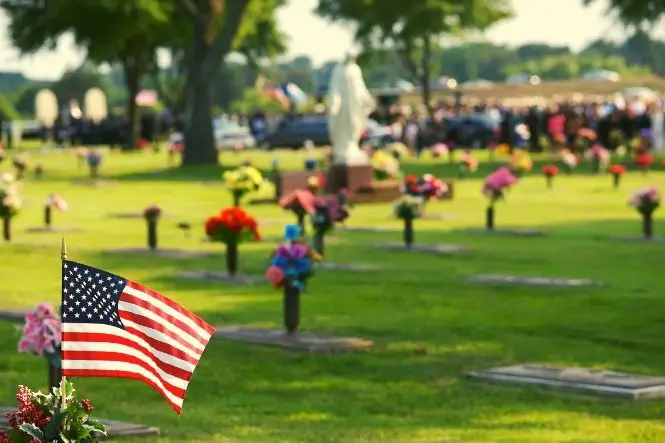Funeral committals are traditional funeral ceremonies that allow family members and other attendees to have a personal moment before lowering their loved ones into their final resting place. The funeral committal ceremony is often an intimate gathering, but there is no limit to the number of people who can gather to pay their respects at these beautiful ceremonies.
Typically, invite people to the committal ceremony if they were close to the person who passed away. The location of these ceremonies changes based on the type of funeral arrangement you have planned. For instance, cremation ceremonies are typically held at crematoriums, and burial committals are held at their gravesite.
What is a funeral committal?
A funeral committal is a final ceremony after the funeral service. This short but touching ceremony lets attendees say a final goodbye to their loved ones before giving them a farewell into the afterlife.
It is a separate service from the funeral or viewing service, typically offered to a general audience of friends and colleagues. The funeral committal is typically offered to people who were closer to the person who has passed away.
Funeral committals give families, close friends, and other attendees the chance to say their final words before sending their loved ones to their final resting place. It is an intimate and respectful ceremony, with prayers, poems, and an officiant who recites precious words about the person who has passed away.
Burial Committals
Burial committals are a traditional form of committal where family and friends gather at their loved one’s gravesite to say their final words before lowering them into their final resting place. People will gather one by one to speak to their friend or family member before an officiant will read poems and say kind words about your loved one.
After everyone has said their final words, you will lower your loved one into their grave, and the officiant will continue reading select verses.
Cremation Committals
Cremation funeral committals are modern committals that occur before cremation. These happen in the crematorium, where family and friends get the chance to say final words. It is a different ceremony than the viewing ceremony from the funeral.
During the cremation committal, you have the chance to say your final goodbye. Afterward, your loved one resumes the cremation process. You and the rest of the attendees will not be present for the cremation process, nor will you see any part of it.
After the cremation process, some people hold another private committal ceremony before burying their loved one’s cremated remains. Burying their cremated remains is important to many religions, such as Catholics. However, it is not always the case. Some people choose to keep their cremated loved ones, so they may hold onto them or scatter them in special places.
Planning a Funeral Committal
Planning a funeral committal does not always have to be an intimidating process. If you allow yourself to relax and approach the experience with a full heart, you can send your loved one into their final resting place with gratitude, love, and joy.
In addition to inviting people with who your loved one spent their lives to celebrate this final moment, you may feel inclined to create a more special feel. You can make the committal ceremony even more special by adding flowers, inviting a choir, or choosing many other special additions to make the grievous moment less disheartening.
People may add cheerful music, invite the church choir, or follow their funeral committal with another lighthearted ceremony. In any case, funeral committals are a way to say farewell peacefully.
Who attends a committal ceremony?
Attendance to a funeral committal ceremony is at the discretion of the committal ceremony planner. There is no limit to the number of people who can attend a funeral committal in most cases. However, rare events like COVID may sometimes restrict the number of guests allowed at each service.
When you are limited on the number of guests you can invite, it can become complicated who to invite to both the funeral service and the funeral committal. Many people choose who attends based on the available space and their closeness to the person who has passed away.
Invite family, close friends, and people who were especially meaningful in your loved one’s life.
Many people ask an officiant to join them at the ceremony to read a select poem or say a few words. If you are a member of a specific church, you may ask your pastor to join you as well to read your loved one’s favorite bible verse. When inviting people to the funeral committal, add a plus one for your officiant or pastor.
Where is the committal ceremony held?
As mentioned previously, the location of the committal ceremony is based on the funeral arrangements of your loved one. Typically, the funeral service and committal ceremony are not held in the same location. In most cases, there are transportation options from the initial service area to their final resting location.
Cremation funeral committals are typically held at crematoriums before the casket is taken to be cremated. Funeral committals for burials are held at the gravesite before you lay your loved one to rest.
How do you personalise committal ceremonies?
Personalising committal ceremonies is a great way to honor a loved one. Personalization can include anything from playing music all the way to leading your loved one’s casket from their funeral service to their burial site in a parade manner.
You can arrange personalized funeral committal services like this with the funeral home or crematorium at which you are hosting your ceremony.
You should also acknowledge other considerations before the day of your funeral committal by purchasing flowers, a guest book to write final goodbyes, and selecting a proper headstone for your loved one. If you plan on burying your loved one, you should have already chosen the casket and headstone in advance -in addition to selecting the plot.
People love to send special farewell messages and pay their respects in unique ways like sending balloon messages, although loved ones and friends may do this at the funeral instead.


